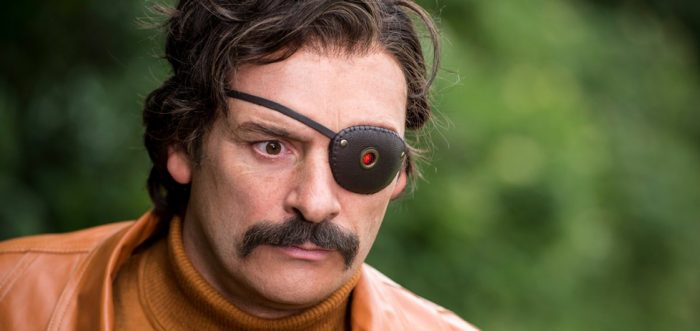
The laughs are easy and as absurdist as ever from co-writers and co-stars Julian Barratt and Simon Farnaby (The Mighty Boosh), in this comedy that plays on ’80s television show tropes to farcical effect. With a brand of humour totally removed from current times and a refreshingly original story, Mindhorn is a film destined for cult status in years to come.
Set on the Isle of Man, home of film productions due to its tax incentives, the movie sees Barratt playing washed-up actor Richard Thorncroft. He was once the star of Mindhorn, a TV detective show where his character’s identity consisted of a thick moustache, a garish orange turtleneck teamed with too-tight pants, and the pièce de résistance — a bionic eye-patch that allowed him to literally ‘see’ the truth. His fame was such that action figures were manufactured chanting his catchphrase: “It’s truth time.” Thorncroft had it all: flocks of fans, a beautiful girlfriend in the form of co-star Patricia Deville (Essie Davis), and a stunt double at the ready (Simon Farnaby playing his character Dutch to inexplicable yet amusing ends.)
But 25 years on, Thorncroft’s star has long since faded, with a failed attempt to transfer his success to Hollywood leaving him broke and unemployable. His ex-girlfriend now lives with his stuntman and a teenage daughter who may or may not be his, while he resides in a tiny flat in London, bald and with a prominent paunch. Even a supporting actor from the TV show, Peter Eastman, played hilariously straight-faced by Steve Coogan, has a thriving spin-off career.
Thorncroft’s luck changes somewhat when a mentally unstable killer calling himself The Kestrel (Russell Tovey) calls up DC Baines (Andrea Riseborough) in Isle of Man, demanding to speak with Mindhorn only, convinced that the character is real and that he can help clear his name. Thorncroft agrees to help for personal gain, hoping the publicity will give him traction for a second chance at a life in the spotlight, and win back Patricia.
What ensues is a bizarre series of twist and turns that give Barratt the opportunity to fully flex his slapstick and comedic skills. Director Sean Foley employs classic police thriller conventions in his first feature film, such as motorbike chases, shootouts, and a stand-off that involves some kind of windmill contraption. He’s not breaking any new ground, but he’s doing it all exceedingly well, framing it with a watchful eye that asks you to keep tabs of little background details that could potentially be nothing more than clever red herrings.
All of this makes for a delightfully meta storyline that turns Thorncroft’s life into a Mindhorn episode, as he goes about seeking justice in renegade fashion. Barratt is the embodiment of impeccable comedic timing, whether he’s verbally sparring with Farnaby or trying not to die while being taped into a papier mâché replica of his Mindhorn costume. His Thorncroft earns our empathy despite his narcissism, perhaps because all those around him seem so determined to quell his madcap hunt for the truth.
Stand out moments arrive when the surrealism is taken up several notches, such as a scene where Thorncroft decides to use his mysterious capoeira powers to win a gunfight, dodging bullets with a flick of his hips and a kick in the air. Again, it’s Barratt’s total commitment to the physical comedy that leaves you heaving with laughter. Elsewhere, it’s the small jokes that gradually weave themselves together into a truly masterful tapestry; throughout the film hints are dropped about Thorncroft’s attempts to retrieve his fame: the orthopaedic sock ads, the disastrous audition with a horrified-but-polite Kenneth Branagh (playing himself), the no-hit wonder song he released, “You Can’t Handcuff The Wind.”1 These amusing insights help fashion a somewhat human persona for Thorncroft, so that when we’re expected to fear his mortality we aren’t just barracking for a caricature, but a very odd yet lovable man.
Although the pacing of the film experiences some slack once we know the main twist in the story, Barratt’s performance ensures we are invested in seeing the outcome. He is supported by an equally talented cast who seem to be thriving in comedic grounds: Essie Davis switches from taciturn to goofy in a moment’s notice, and Russell Tovey imbues his manic Kestrel with a gentle child-like demeanour that makes him impossible not to adore. And while these characters face seemingly countless obstacles, there’s no dumbing down of its very niche humour. This might alienate some, but for most, it’s a dip into inventive comedic waters that is truly worthwhile.
